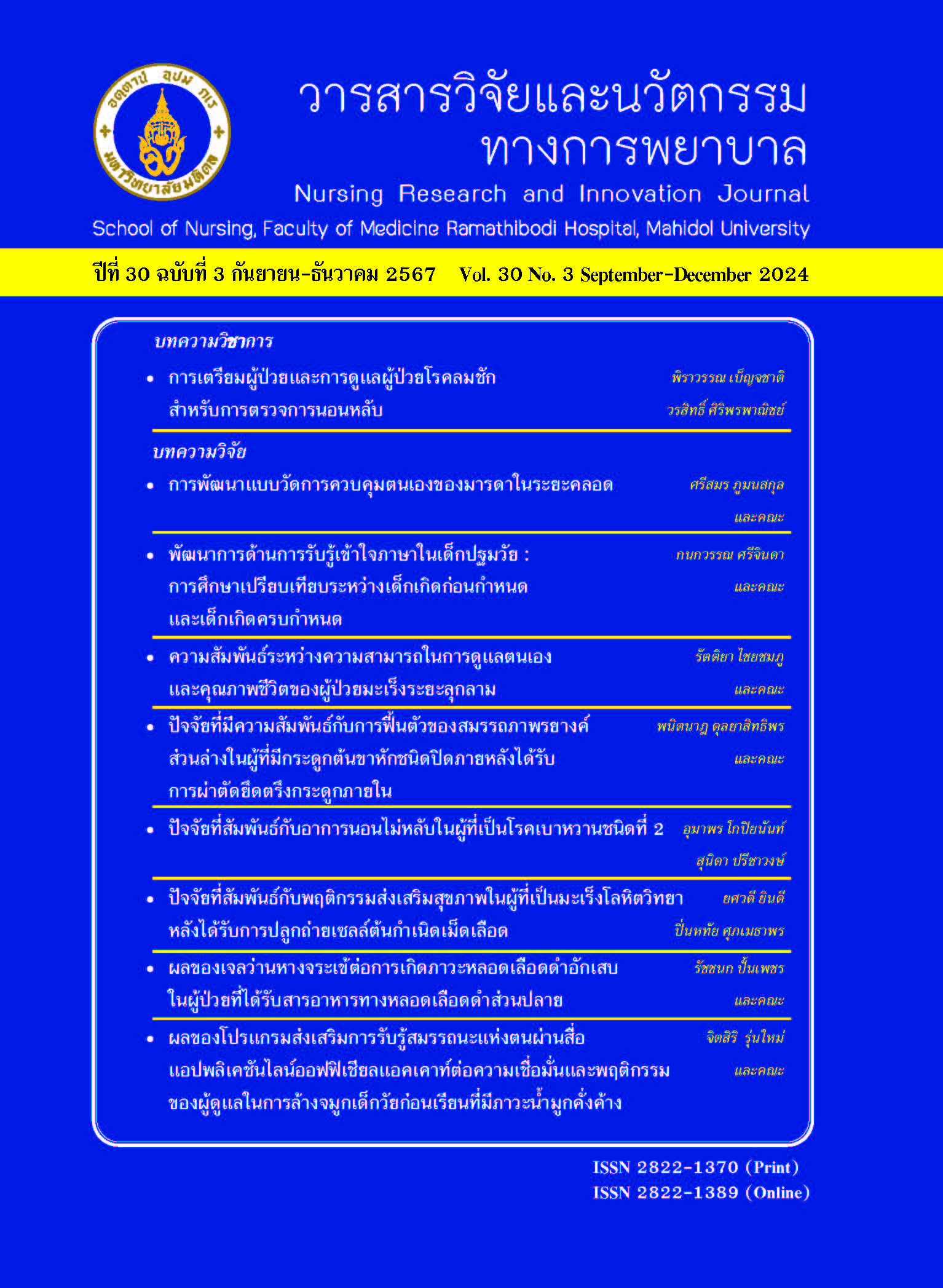Correlation between Self-care Ability and Quality of Life of Patients with Advanced Cancer
Main Article Content
Abstract
This descriptive correlational research aimed to describe the self-care ability and quality of life in patients with advanced-stage cancer and examine the correlation between them. The sample consisted of 222 patients with advanced cancer receiving both inpatient and outpatient services. Participants were selected by purposive sampling.A personal information questionnaire, the Self-care Ability Assessment, and the Thai version of the EORTC QLQ-C30 Quality of Life Questionnaire were used as research tools. Data were collected by patients’ self-administration. Descriptive statistics and Spearman's Rank Correlation were used to analyze the characteristics of the sample and the relationship between self-care ability and quality of life, respectively. The findings showed that overall self-care ability was at a low level, with particularly low knowledge and skills concerning self-care. The global quality of life and functioning in terms of the emotional, role, and social aspects of the patients with advanced cancer were found to be at a good level. However, quality of life regarding cognitive and physical functioning and the symptom aspect was revealed to be below the reference standard. When analyzing the correlation, it was found that the self-care ability of the patients was positively correlated with their physical functioning, while self-care ability was negatively correlated with their symptoms. Therefore, developing a knowledge and supportive system and strengthening appropriate self-care ability would enhance the quality of life for patients with advanced cancer.
Keywords: Advanced cancer, Quality of life, Self-care ability
Article Details

This work is licensed under a Creative Commons Attribution-NonCommercial-NoDerivatives 4.0 International License.
บทความ ข้อมูล เนื้อหา รูปภาพ ฯลฯ ที่ได้รับการตีพิมพ์ในรามาธิบดีพยาบาลสาร ถือเป็นลิขสิทธิ์ของวารสาร หากบุคคลหรือหน่วยงานใดต้องการนำทั้งหมดหรือส่วนหนึ่งส่วนใดไปเผยแพร่หรือเพื่อกระทำการใด ใด จะต้องได้รับอนุญาตเป็นลายลักษณ์อักษรจากรามาธิบดีพยาบาลสารก่อนเท่านั้น
References
Cancer Research UK. Worldwide cancer incidence statistics; 2023 [cited 2023 June 24]. Available from Cancer research UK Web site: https://www.cancerresearchuk.org/health-professional/cancerstatistics/worldwide-cancer/incidence#heading-One
Kokkonen K, Tasmuth T, Lehto JT, Kautiainen H, Elme A, Jääskeläinen AS, et al. Cancer patients’ symptom burden and health-related quality of life (HRQoL) at tertiary cancer center from 2006 to 2013: a cross-sectional study.Anticancer Res. 2019;39(1):271-77.
Asthana S, Bhatia S, Dhoundiyal R, Labani SP, Garg R,Bhatnagar S. Quality of life and needs of the Indian advanced cancer patients receiving palliative care. Cancer Res Stat Treat. 2019;2(2):138-44.
Ruijs CD, Kerkhof AJ, van der Wal G, Onwuteaka-Philipsen BD. Symptoms, unbearability and the nature of suffering in terminal cancer patients dying at home: a prospective primary care study. BMC Fam Pract.2013;14(1):1-17.
Tipseankhum N, Tongprateep T, Forrester DA, Silpasuwun P. Experiences of people with advanced cancer in home-based palliative care. Pacific Rim Int J Nurs Res.2016;20(3):238-51.
Wajid M, Rajkumar E, Romate J, George AJ, Lakshmi A.Exploring the problems faced by patients living with advanced cancer in Bengaluru, India. Heliyon.2021;7(4):1-7.
Orem DE. Nursing concept of practice. 6th ed. Missouri:Mosby; 2001.
Dongen SI, Nooijer K, Cramm JM, Francke AL,Oldenmenger WH, Korfage1 IJ, et al. Self-management of patients with advanced cancer: a systematic review of experiences and attitudes. Palliat Med. 2020;34(2):160–78.
Junsomkoy C, Wirojratana V, Chanruangvanich W.Relationships between basic conditioning factors, symptom severity, palliative self-care behaviors and quality of life in older adults with advanced cancer receiving chemotherapy. Journal of the Royal Thai Army Nurses.
;19(2):108-17. (in Thai)
Naewjumpa C, Saneha C, Puwarawuttipanit W,Soparattanapaisarn N. Symptom experiences, symptom management strategies, and functional status in outpatient with breast cancer stage IV receiving chemotherapy.Journal of Thailand Nursing and Midwifery Council.
;29(1):15-28. (in Thai)
Schulman-Green D, Bradley EH, Knobf MT, Prigerson H, DiGiovanna MP, McCorkle R. Self-management and transitions in women with advanced breast cancer. J Pain Symptom Manage. 2011;42(4):517–25.
Weeks JC, Catalano PJ, Cronin A, Finkelman MD, Mack JW, Keating NL, et al. Patients’ expectations about effects of chemotherapy for advanced cancer. N Engl J Med.2012;367(17):1616–25.
Suratako S, Preechakoon B, Namvongprom A, Yodying T, Prangjan T, Pakdevong N-oy, et al. Educative-supportive care needs and received among patients with advanced cancer and caregivers. Journal of Nursing Science and Health. 2021;44(2):109-20. (in Thai)
EORTC Quality of Life Group. EORTC QLQ-C30 reference values; 2008 [cited 2023 November 20].Available from EORTC Quality of Life Group Web site:http://www.eortc.org/app/uploads/sites/2/2018/02/reference_values_manual2008.pdf
Silva L dos S, Lenhani BE, Tomim DH, Bittencourt Guimarães PR, Kalinke LP. Quality of life of patients with advanced cancer in palliative therapy and in palliative care.Aquichan. 2019;19(3):1-14.
Wongketkit K, Wirojratana V, Chanruangvanich W.Factors predicting quality of life among older adults with advanced cancer receiving palliative care. Thai Journal of Cardio-Thoracic Nursing. 2022;33(1):117-31. (in Thai)
Freire ME, Sawada NO, de França IS, da Costa SF,Oliveira. Health-related quality of life among patients with advanced cancer: an integrative review. Rev Esc Enferm USP. 2014;48(2):351-61.
Norwood SL. Research strategies for advanced practice nurse. New Jersey: Preution Hall Health; 2000.
Bloom BS, Hasting JT, Madaus GF. Handbook on Formative and Summative Evaluation of Student Learning.New York: McGraw-Hill Book; 1971.
Silpakit C, Sirilerttrakul S, Jirajarus M, Sirisinha T,Sirachainan E, Ratanatharathorn V. The European Organization for Research and Treatment of Cancer Quality of Life Questionnaire (EORTC QLQ-C30): validation study of the Thai version. Qual Life Res. 2006;15(1):167-72.
Moghazy NAE, Hafez GE, Ibrahim AAM. Effectiveness of self-care practices education program on enhancing chemotherapy adverse effects and quality of life for patients with gastric cancer. EJHC.2020;11(2):867-89.


